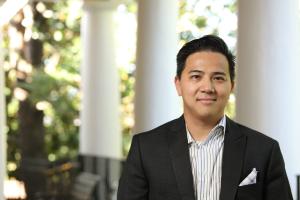
N. Rich Nguyen, an assistant professor of computer science, is co-organizing the inaugural International ASEAN Smart City Symposium: Experiences and Innovations, which will be held Dec. 19-20 in Da Nang, Vietnam. In a way, the event will bring full circle a yearslong collaboration between UVA’s Department of Computer Science and partners across the world.
ASEAN is the Association of Southeast Asian Nations. The symposium is part of a larger collaboration, which includes a National Science Foundation-funded project for which Nguyen is the principal investigator, involving the U.S.-ASEAN Smart Cities Partnership, the U.S. State Department, Vietnam National University – Ho Chi Minh City, the University of Da Nang, and stakeholders in cities served by ASEAN.
Nguyen’s NSF-funded research, “Distributed Data-Sharing for Fast Response and Decision Support” is premised on the principle that “The vision of a smart city is underpinned by its ability to collect, manage, and use data.”
The researchers aim to address challenges in how city agencies, public institutions and community stakeholders share and access data when and where they need it for fast and effective decision-making. The team is developing a distribution infrastructure that allows data owners to share information effortlessly and securely while at the same time allowing users to access data on demand for disaster support and response.
Hands-On Programming Opportunities for Undergraduates
In response to feedback from colleagues in Vietnam, Nguyen’s team has recently focused the project on forecasting urban flooding, a frequent occurrence in one of the world’s most natural disaster-prone countries. They are developing an artificial intelligence-enabled platform called Floodwatch.io, with the goal to pilot the system in Ho Chi Minh City and Da Nang City next year.
“The collaborating team in Vietnam has expertise and experience in urban flood modeling,” Nguyen said. “They also have access to the necessary data, for example, roads, drainage infrastructure, rain gauges and weather forecast.”
Nguyen recruited five undergraduate students to work on Floodwatch.io, involvement that includes sharing the development practices they are learning through the project with students in Software Development Essentials. Nguyen teaches the course, which is required for all computer science majors.
The ASEAN Smart City Symposium will bring academic researchers together with representatives from cities, community organizations and industry around four discussion themes designed to benefit residents of ASEAN cities: Urban Operations, Digital Transformation, Well-being and Living, and Governance and Economy.
Conference participants will hear from ASEAN city administrators and community leaders about what has worked and what hasn’t in real-world deployments of smart city technologies. The research and development community will share new ideas and solutions that could underpin future smart city efforts.
“Similarly to our discussion with stakeholders in Vietnam, this symposium is important to our research as it serves as our listening session to the perspective of residents and local thinkers about Floodwatch.io,” said Nguyen, who is co-organizing the conference with Tho Nguyen, formerly of UVA and currently a senior program officer at the National Academy of Science; Fabien Ferrero, a professor at the University of Cote d’Azur, France; and Anh-Thu Nguyen, a professor at the University of Da Nang, which is hosting the event.
“It also brings our team closer to the research community, who potentially can benefit from our data platform,” Nguyen said. “Beyond flood prediction, the concept of the Floodwatch.io data platform can be extended to other applications across multiple smart city technologies ranging from public safety to environmental protection.”